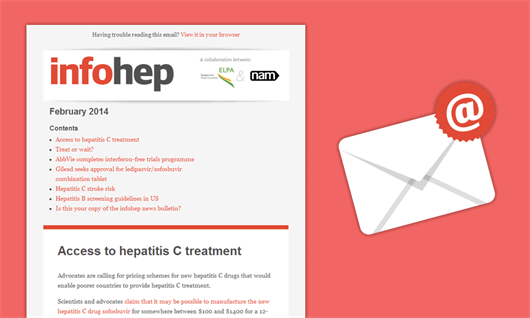Globally up to 150 million individuals have hepatitis C virus (HCV). The infection therefore represents an important global health challenge, especially for poorer countries. Prevalence of HCV infection is high in sub-Saharan Africa, according to a new report published in The Lancet Infectious Diseases. UK investigators conducted a meta-analysis of 213 studies involving approximately 1.2 million people in 33 countries. Overall HCV prevalence was 3%, however this varied between regions, ranging from 7% in central Africa to 4% in west Africa and 1% in southeast Africa. Approximately 6% of people with HIV had HCV co-infection.
Having trouble reading this email? View it in your browser
| |
July 2015 | |
Hepatitis C in sub-Saharan AfricaRibavirinRibavirin remains a component of interferon-free treatment for some patient groups, particularly those with liver cirrhosis or a previous history of non-response to treatment. Ribavirin improves the effectiveness of direct-acting antiviral regimens in some groups of people, but comes with difficult-to-tolerate side-effects, chiefly anaemia. An analysis of the phase III ION studies of sofosbuvir/ledipasvir (Harvoni) published in Hepatology concluded that adding ribavirin to Harvoni did not improve response when people were treated for 12 weeks, and led to more adverse events. Importantly, only 11% of participants in these studies had cirrhosis, and the inclusion of ribavirin in a regimen may still improve the chances of a cure for this patient group when treated with Harvoni. AbbVie reports on long-term post-cure outcomes of hepatitis C treatmentNew interferon-free regimens cure hepatitis C infection in the vast majority of people, and so prevent further liver damage. Less is known about the long-term health of people after they are cured of hepatitis C. For example, it has been unclear whether damage to the liver is reversed after hepatitis C is cured, or whether hepatitis C cure reduces the subsequent risk of developing liver cancer in people who already have moderate or severe liver damage. Analysis of clinical trials that led to the approval of AbbVie’s interferon-free regimen of the HCV protease inhibitor paritaprevir with a ritonavir booster plus the NS5A inhibitor ombitasvir in a once-daily coformulation, taken with the NS5B polymerase inhibitor dasabuvir, shows that laboratory markers associated with liver fibrosis improved during treatment. These improvements were sustained one year after treatment was completed. These findings were presented at the International Liver Congress in Vienna, Austria, in April. These studies looked at laboratory markers only; further evidence regarding the impact of treatment on the liver is needed from long-term follow up of people who have been cured of hepatitis C. UK treatment accessThe United Kingdom’s National Health Service has announced that it will fund hepatitis C treatment for people with cirrhosis and those with advanced liver disease and at risk of death or irreversible damage. However, many of the recommendations differ from those made by the European Medicines Agency when products were approved. In general, the UK recommendations update those made at the time of product approval. UK funding for hepatitis C treatment is to be raised to £190 million in the 2015/16 financial year. The Hepatitis C Trust and other groups have criticised NHS England attempts to delay the introduction of new hepatitis C drugs on the grounds of cost, despite an assessment from the National Institute for Health and Care Excellence (NICE) showing that the drugs are cost-effective in the UK. Liver transplantation in HIV and hepatitis C co-infectionLiver transplantation remains a relatively rare procedure among people living with HIV, due in part to concerns about poorer survival and higher rates of organ rejection in people with HIV. A recently published review of 11 years’ experience of liver transplants carried out in the United States, outside clinical trials, shows that people with HIV and hepatitis C co-infection were significantly more likely to experience organ rejection than people with hepatitis C alone or HIV alone after undergoing a liver transplant. The study investigators say that their findings underline the importance of treating hepatitis C either before or immediately after liver transplantation in order to improve outcomes, rather than assuming that people with co-infection will have poorer outcomes based on historical data. New booklets from the London Joint Working Group on Substance Use & Hepatitis C and Dr Harris, LSHTM
Two new booklets, Hep C Info and Hep C Care, have been published by the London Joint Working Group (LJWG) on Substance Use and Hepatitis C and Dr Magdalena Harris of London School of Hygiene and Tropical Medicine (LSHTM). Hep C Info explains what hepatitis C is, how to avoid getting it or passing it on, as well as information on your rights to testing and treatment. Hep C Care contains information about living with hep C, your rights and treatment choices. Both booklets were developed by LJWG in partnership with Dr Magdalena Harris of London School of Hygiene and Tropical Medicine, with service user input. For more information or to order hard copies of the booklets (subject to availability), please email LJWG: info@ljwg.org.uk. Is this your copy of the infohep news bulletin?
Is this your copy of the infohep news bulletin, or did you receive it from a friend or colleague, or find it online? You can sign up to receive this monthly email bulletin, free of charge, on our website, where you can also find an archive of all the infohep news bulletins. | |
 Latest treatment news and information for patient advocates and people working in hepatitis in Europe. For more details, please contact: To unsubscribe please click here Privacy Policy |



Connect with infohep on Facebook: Keep up to date with all the latest news and developments.
Follow infohep on Twitter for links to news stories and updates from infohep.org. Follow us at www.twitter.com/infohep.
Follow all the infohep news by subscribing to our RSS feeds.